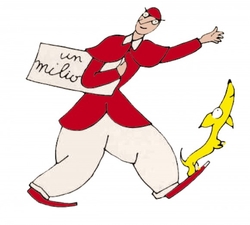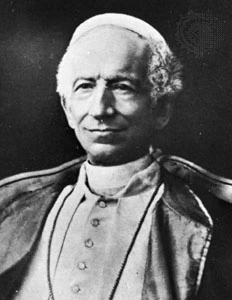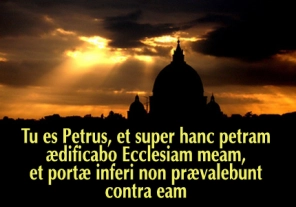Latin Mass, Or: In Praise Of The Woman Peasant.
I have read somewhere around (I forget where) that Italians had a traditionally higher acceptance for the Latin Mass, because the language was easier for them to understand. I beg to differ, and would like to make some additional observations on the matter.
Latin is as similar to Italian as French; or you could say, as English is to German. Many words have the same roots, and Italian friends of mine visiting me in Germany could pick an awful lot of words from daily life because of their similarity to the English version (water/Wasser; bear/Baer, warm/warm, cold/kalt, and countless others). Still, on hearing someone speaking in German exactly the same night fell over them than the Italian would experience on hearing the Latin Mass. In fact, expressions like “this is Latin to me” are commonly used in the same sense as the English “this is Chinese to me”, meaning: can't understand a word of it.
No. Latin is, to every Italian who has not learned it, a foreign language like, say, French or Portuguese (not Spanish, though; not even close). Why, then, was Latin so universally and readily accepted?
The answer is simple: Catholicism; or, if you wish, obedience.
The uneducated woman who prayed her rosary during Mass, or was simply content to stay there and listen, or perhaps had access to a Latin-Italian Missal was much smarter than many a village pharmacist, or country doctor, or educated landowner – all very fit in Latin and Greek, no doubt; and History, and Philosophy – in this: that she had the humility to accept what the Church gives to her.
Not for her to question whether the Mass is suitable to her. Not for her to wonder whether this strange language “hurts” her “feelings”, in that it makes her feel “excluded”. Not for her to demand that the Church changes the Mass making of it something she can “relate to”.
In those times, people did not put themselves at the centre of the Universe. There, they put God. If they were of humble condition, this helped them to carry their condition, in devout humility, over to the spiritual sphere. The Latin Mass was for them, in the same way as the weather or the seasons, part of the God-given order of things. They may not have understood a word of it (it was, actually, “Latin to them”), but they knew it was good for them, and exactly how things have to be.
How smart, how soundly and robustly orthodox this humble thinking is! Much, much smarter than being educated, and to abuse this education to question the things of heaven, or the way the things of heaven are carried on here on this earth.
The same peasant woman must have been shocked at being told that heaven would now come down to earth and lower itself to her; that the Mass would now be in Italian, so that she can “understand”; that she was too dumb to cope with a more elevated reality than herself, and therefore this reality would be dumbed down so she can reach it, touch it, and have a chat with it, courtesy of people with less faith than she had in her little finger.
But you see, the peasant woman was smart enough as she was: she could cope perfectly well with the supernatural nature of the Mass; she was too smart to refuse a mystery just because she could not understand it; she welcomed the contact, and be it from somewhat afar, of a reality so much bigger than herself; she was content enough at this supernatural reality being made accessible for her in the ways the Lord had disposed. If she felt she was very little, it was because she was smart enough to understand she was, and to understand we all are.
Obedience. Submission. Humbleness. This is the way to heaven. Knowledge that leads one to question truth isn't wisdom, but foolishness. It is better for one to be born, live and die a humble peasant who gets the truth, than to become an extremely learned man who questions it.
This is, I think, why those peasants not only accepted, but loved that incomprehensible mass they listened to every day. When a glimpse of heaven descended down to them and revealed itself to them with a great miracle they did not demand that it adapt to them, and they fully understood the importance and the sacredness of the miracle. They were, possibly, even helped to better understand that sacredness by the very fact that they could not understand the language. It told them, in a simple way, that the Mass is from heaven.
When they died, those humble peasants had, in most cases, far better cards than those who had misdirected their intelligence or their education, and made of them harmful tools directly endangering their salvation.
Education is good, of course. Intelligence can do wondrous work for God. But a Christian must direct all his gifts to the right aim. The man – no matter how educated – abusing his education to question Truth is akin to an ant considered very smart by her fellow ants, and doubting the existence of the Milky Way.
And the funniest thing of them all is that nowadays – in times of mass “higher education” that does not even manage to give basic literacy skills – a lot of people think themselves educated, but are little above illiterate peasants anyway.
M
Posted on June 5, 2015, in Catholicism, Conservative Catholicism, Traditional Catholicism and tagged Latin Mass. Bookmark the permalink. 12 Comments.




















Off topic but a bigger problem than the TLM /NO question:
http://angelqueen.org/2015/06/05/one-of-popes-closest-advisors-how-pope-francis-is-changing-the-church/
Seems like a loser’s hope to me. ” we wanted to make a revolution, now we are happy with baby steps because the changes might remain”. Only: if the revolution would not have stood the test of the next papacies, why would the baby steps?
M
Wonderful! Thank you so much for this clear, inspiring post. I think it was Pius XII who urged Catholics to ‘pray’ the Mass using the missal. Sounds good but is it really? We mostly have our heads down reading the words the priest says during the Consecration instead of hearing the bells and looking UP to our Saviour. And why do we have to read the words the priest, fittingly, says on our behalf? Thanks again for putting into words what I have felt for a long time.
Starting from St. Pius X, there was a growing encouragement to “pray the mass” rather than “pray during Mass”. However, thi smust always be understood in the context, and certainly in a context of growing education.
It is most certainly not bad to have a missal, but a missal was already a luxury object for your average peasant family; this, provided they could read in the first place.
But again, who knows how many illiterate peasants have gone to heaven with the express train…
M
There is something in that. I like to have a Missal for the readings (weekday Mass there is no translation although Sunday it is read in Latin then repeated in translation). I also like a Missal to follow the main prayers in Latin (Pater noster for example). However I don’t like to have my head in a book all the way through. With time one becomes accustomed to the Latin prayers and memorizes the main ones by heart. In between the bits that I do use my missal for, I prefer to watch and listen. I usually tell my children to follow the Mass of the catechumens in the missal then watch for the Mass of the faihthful. The Latin Mass is very visual. A certain amount of book-learning is helpful but it’s not the be all and end all. The TLM is a “work of genius”. It caters for the educated and the uneducated alike.
“EVERY man naturally desires knowledge ;but what good is knowledge without fear of God? Indeed a humble rustic who serves God is better than a proud intellectual who neglects his soul to study the course of the stars.”
Thomas a Kempis
Questa pagina merita un 10 Mundabor
Grazie!
M
This post reminds me of my greatgrandmother who I never knew but heard stories about. She was an Italian immigrant to America as a young wife and mother of five, who had four more children over here (no contraception needed!). She was simple, illiterate, good hearted, and spent much time in church. I realized just now that she must have felt very much at home hearing the Latin mass as she would have heard the same in Italy. That was the way it was in the old days, one could go to a Catholic Church anywhere in the world and they would hear exactly the same Mass. How much things have changed for the worse. Keeping the Mass to the same standard meant keeping the Mass pure.
Yes, it’s like taking a beautiful Rodin sculpture and writing a description of it in place of the senses perceiving. Once people “think” they know something it can cease to be important. Only, it is much more serious when we “think we know” what God is telling us. The Mass, thanks be to God, will never be put into words anyway. For some of us, maybe fewer than ever, I concede, the mystery and communication of Christ’s body and blood to those who are listening to His Sacred Heart calling us, is as loud and clear as when He walked our streets. No changes can really shut him up, no matter how hard they try!
In our chapel (TLM) we have a beautiful stained glass window high above the Altar. It shows The Lamb on a sacrificial altar surrounded by angels, then beneath it a Holy Spirit dove carrying a host down. Directly underneath is the back piece of the Altar with a huge statue of Christ wearing a crown. Directly below again is the crucifix standing on top of the tabernacle. At the consecration, the priest facing the Altar raises the host up towards the crucifix. A picture paints a thousand words. You would only need a bare minimum of catechesis to understand sin, repentance, confession before communion then if you did nothing except look at the pictures during Mass you would probably understand more than is understood in many a modern parish. Sometimes it’s the clever people who don’t see the wood for the trees.
Pingback: Poslušnost. Podređenost. Poniznost. To je put u Nebo - Quo Vadis Croatia